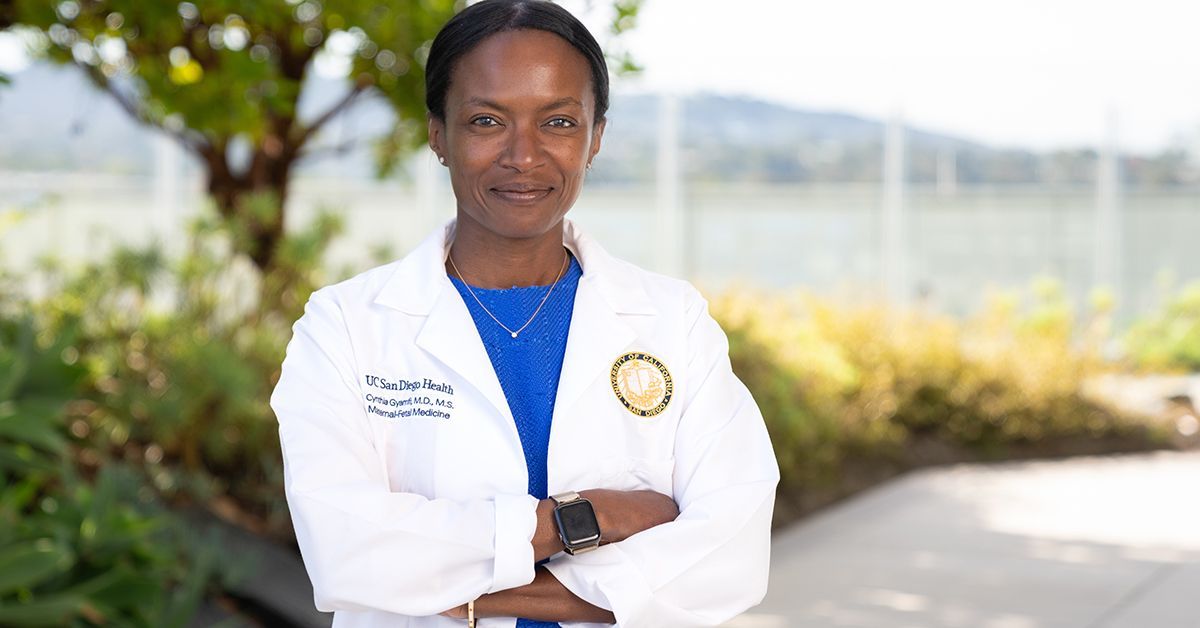UC San Diego OBGYN Chair Named 48th President of the Society for Maternal-Fetal Medicine
Cynthia Gyamfi-Bannerman, MD, is the first UC San Diego faculty member to serve as president of the leading national medical society for high-risk pregnancy subspecialists
Published Date
Story by:
Media contact:
Topics covered:
Share This:
Article Content
Cynthia Gyamfi-Bannerman, MD, SC Yen Endowed Chair of the Department Obstetrics, Gynecology and Reproductive Sciences, and tenured professor of obstetrics and gynecology at University of California San Diego School of Medicine, is now president of the Society for Maternal-Fetal Medicine (SMFM) for the 2024-2025 term, after serving as president-elect last year.
Based in Washington, D.C., and inclusive of more than 7,100 multi-disciplinary health care members and representing perinatologists, SMFM works toward optimizing equitable health outcomes for all birthing people. Established in 1977, SMFM is the professional voice uniting clinicians and researchers with expertise in high-risk pregnancy care.
As a board-certified maternal-fetal medicine physician for UC San Diego Health and prominent researcher at UC San Diego School of Medicine, Gyamfi-Bannerman will champion the future of care for complex pregnancies as president of SMFM.
We spoke with Gyamfi-Bannerman as she steps into this important role to learn more about her vision to chart a collaborative trajectory for highly qualified leaders in obstetrics-related fields and improve the pregnancy experience for patients.
How do you feel about serving as SMFM’s new president?
An opportunity to serve in this leadership position, representing maternal-fetal medicine physicians around the world, is an incredible honor. SMFM is the voice of high-risk pregnancy experts, so my ability to make an impact on this specialty and the patients for whom we care is vast. I hope to advance maternal-fetal medicine through advocating for critical translational research. Additionally, we will plan continued development of clinical guidance and lifelong learning opportunities for maternal-fetal medicine physicians, while navigating the reproductive health crisis in coalition with partner organizations.
I appreciate the support I have received from my faculty and trainee colleagues here at UC San Diego along with colleagues from around the world. Together we will work to advance our field and our reach, improving patient outcomes and eliminating health disparities.
What are your goals as president?
As president, I hope to encourage dialogue on the importance of research on mitigating preterm birth, both in the proportion of individuals delivering preterm and in the unacceptable disparities in these outcomes. While much of my work has focused on preterm birth, robust interventions to decrease prematurity are still lacking and momentum towards a solution seems to be waning. I hope to engage transdisciplinary efforts to address and finally solve this problem, which is the greatest driver of infant morbidity and mortality.
SMFM is uniquely positioned to address approaches that maternal-fetal medicine physicians — obstetrician-gynecologists who specialize in high-risk pregnancies and fetus health complications — can take to manage serious health concerns, such as complex pre-existing maternal conditions, preterm birth, fetal distress, cardiac disease, genetic disorders, gestational diabetes, and hypertensive disorders of pregnancy, among so many others. To this end, I intend to continue to collaborate with obstetric and non-obstetric medical organizations in order to integrate our recommendations to the benefit of our patients. Education is paramount, and we will continue to offer up-to-date courses on high-risk obstetrics topics for health professionals and trainees to foster growth and community. Advanced skills are key to caring for the health and safety of pregnant people; however, racial bias training is equally important as clinical training and will help to inform policies on how high-risk pregnancy providers can deliver outstanding care free of exclusion, discrimination or personal bias.
Research demonstrates that systemic racism has deleterious effects on pregnancy outcomes. With soaring maternal morbidity and mortality rates, especially high for Black women, alarming racial disparities exist. Achieving health equity is a personal goal and a shared goal with SMFM.
What is your favorite aspect of being a professor and perinatologist?
As a faculty member at UC San Diego School of Medicine, mentoring the next generation of clinicians and physician scientists, as well as spending time training resident and fellow physicians is very rewarding, knowing that their outstanding care and research discoveries will improve health care for our local communities and for the broader scientific community. However, the best day for any perinatologist is when an extremely high-risk patient has a good pregnancy outcome. There is no substitute for that feeling.
What makes the UC San Diego Department of Obstetrics, Gynecology and Reproductive Sciences unique?
The Department of Obstetrics, Gynecology, and Reproductive Sciences at UC San Diego School of Medicine is home to seven divisions at UC San Diego Health, including maternal-fetal medicine, complex family planning, gynecologic oncology, reproductive endocrinology and infertility, urogynecology and reconstructive pelvic surgery, obstetrics and gynecology and hospitalists. Additionally, the department has its own culture and justice quorum with ambassadors committed to diversity, equity, inclusion, justice, and belonging in order to serve our community with quality and just health care.
Seventeen state-of-the-art basic and translational research laboratories, the Center for Perinatal Discovery, the Center for Reproductive Science and Medicine, the Center for OBGYN Research and Innovation, and the Glycobiology Research and Training Center are all supported by the department.
For 2023-24, U.S. News and World Report ranked UC San Diego Health as the No. 1 hospital system in San Diego and among the nation’s best in 10 adult medical and surgical specialties, including No. 15 for obstetrics and gynecology care and a high performing hospital for maternity care for the second year in a row. This distinction is significant because it recognizes the highest standards of care for patients of different races, ethnicities and socio-economic backgrounds. Cesarean section, newborn complication, breast feeding, episiotomy and vaginal birth rates are also factored in to this honorable achievement.
What are your forecasts for the future of maternal-fetal medicine?
Maternal-fetal medicine is growing and continuously evolving as we develop new and innovative approaches to prenatal screening and diagnosis, better manage pregnancies with complex maternal conditions and further address the great obstetric syndromes — namely preeclampsia, preterm birth, stillbirth and fetal growth restriction.
Our field is committed to eliminating health disparities and improving care and access for all individuals, as evidenced by our expanding advocacy work. Tomorrow’s clinical studies based on translational research will continue to generate novel bench-to-bedside approaches to pre-and post-natal care.
In the next ten years, we will see the transformational and ubiquitous role of artificial intelligence (AI) multiply as this radical methodology is applied to obstetrics on a more frequent basis — from data analysis to screening. As this technology develops, so will ways we can apply AI to help identify and resolve adverse pregnancy problems earlier — especially with patient monitoring, maternal fetal imaging and ultrasonography. I’m fortunate to have a front-row seat to witness the integration of AI-driven technology into the health care and academic settings at UC San Diego.
Learn more about research and education at UC San Diego in: Artificial Intelligence
“Our field is committed to eliminating health disparities and improving care and access for all individuals.”
You May Also Like
Stay in the Know
Keep up with all the latest from UC San Diego. Subscribe to the newsletter today.




